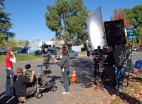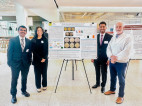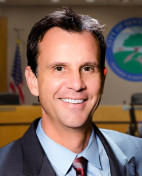 One usually thinks of a fungus as “icky,” and there is no way you’d eat one, right?
One usually thinks of a fungus as “icky,” and there is no way you’d eat one, right?
The impression is that a fungus is creepy. It grows in dark, moist places, obtaining its nutrition from decaying plant and animal matter, and it is generally to be avoided.
Indeed, fungi – which include molds, fungus and mushrooms – are members of nature’s cleanup crew to help recycle living things that have died, returning their nutrients into the ecosystem, allowing them to support the next generation of plants and animals.
Molds are a form of fungus, and black mold, commonly found in homes, can be hazardous to one’s health. However, there is a large variety of fungi, and some of them are either directly or indirectly beneficial to mankind, while others are delicious and a great addition to one’s diet.
Last month we focused on the less pleasant side of fungi. Today, the focus will be on the benefits of fungi.
For literally thousands of years, Eastern cultures have revered mushrooms, commonly including them in many meals. But before turning to the nutritional value of fungi, I should like to focus on a medicinal benefit.

Petri dish with penicillin mold growing on it and displacing the bacteria
Penicillin comes from fungi, and specifically from molds. The discovery of penicillin was really an accident. Sir Alexander Fleming was a bacteriologist working at St. Mary’s Hospital in Paddington, England. (Paddington, the stuffed bear of recent literary and movie fame, got his name from the train station in England). He was actively looking for a material that would inhibit the growth of bacteria.
This started in 1922. While working with some bacteria, he had a runny nose, and some of the mucus dropped onto the Petri dish. The bacteria in the dish disappeared. So his first discovery was that there was a natural substance in tears and nasal mucus that helps the body to fight germs.
He continued his studies by trying to find a substance that could kill bacteria but not adversely impact the human body. To do this, he would grow bacteria in a Petri dish – a small, shallow glass dish with a glass cover – filled with a nutritional medium on which the bacteria could grow. Then, once the bacteria culture was growing well, he would add various items to the Petri dish to assess their impact on the continued growth of the bacteria.
Well, like all of us, he was entitled to vacation. When he returned, he found that most of the Petri dishes had been contaminated and had to be cleaned before the nutrient, agar gel, could be replaced and the experiments started over again.
He found that some of the Petri dishes on which bacteria had been growing now had a mold that was replacing and even eliminating the bacteria. The bacteria that it killed was one that was particularly virulent to man; it was Staphylococcus aureus, comprised of small, round bacteria whose colonies had a golden color.
Working with a mycologist (a scientist who studies mold), they identified that the mold was in the family Penicillium, and hence the name penicillin that is well known to everybody as one of the first antibiotics. Indeed, this mold killed a large number of different bacteria.
Professor Fleming, however, was not a chemist and could not isolate the specific active ingredient. He wrote a paper about these observations in 1929 that was largely ignored by the medical profession at the time. It wasn’t until 1940 that two chemists at Oxford University, Howard Florey from Australia and Ernst Chain from Germany, isolated the active ingredient that we know today as penicillin. All three – Fleming, Florey and Chain – received the Nobel Prize in Physiology and Medicine for the discovery in 1945. Fleming was also knighted and is credited with discovering penicillin. And all of this from a fungus.
Another fungus in the Streptomyces family gave us streptomycin, another powerful antibiotic. The challenge to medical science today is that the bacteria are not “dummies.” They have developed resistance to the older antibiotics which are becoming less and less effective, triggering the search for newer and more potent agents.

Morel mushrooms in the field
While the battle in the hospitals and pharmaceutical labs continues to identify and synthesize the next generation of antibiotic, we can continue to enjoy a multiplicity of mushrooms in our salads, as additives to other foods to enhance their flavor, and sometimes by themselves as an appetizer or main course. This includes morels, chanterelles and shitake mushrooms, but they are not the only ones.
Truffles are considered the king of all mushrooms, at least from a culinary perspective. They are dug up after being identified by pigs sniffing the ground. They look nothing like our classic conception of a mushroom.
Many of the fungi we eat are farmed. Shown here is a photo of a mushroom farm and another photo that I shot in Ya’an, China, in 2012, while on a butterfly photography trip, and we passed a fungus farm. The plastic-wrapped rolls of fungus were ready to take to market.

Chanterelle mushrooms
Besides tasting good and enhancing the flavor of many foods, mushrooms also hold great nutritional benefit, incorporating many different vitamins and trace minerals that are essential to our diet.
People who eat mushrooms on a regular basis are generally healthier than those who do not – but to what degree is due directly to the mushrooms. Those who eat mushrooms also tend to eat more natural foods and a healthier diet than those whose died includes lots of preprocessed and over-the-counter fast foods. For example, Vitamin D is an essential vitamin for our health and the strength of our bones. Vitamin D deficiency results in a disease called Ricketts.

Truffles do not look like a mushroom sitting on a plate waiting be cut up for inclusion is a sauce or other dish
The body makes its own vitamin D, but this requires exposure of a significant amount of skin to the sun on a regular and frequent basis. Even here in sunny Southern California, most of us are dressed for the majority of the day, work indoors, and even when we might go out hiking or jogging or just take a walk for an hour or two, we wear a hat to shade our face, along with pants and a shirt, even short pants and a short-sleeved shirt that covers the majority of our body.
Vitamin D is now incorporated as one vitamin in the various multivitamin pills that can be bought at the grocery store or pharmacy. It is a nutritional supplement in milk; our vegetables, fruits and meat have relatively little vitamin D. Mushrooms are high in Vitamin D.

Shitake mushrooms on a plate
Mushrooms are also a good source of other B-vitamins including Pantothenic acid, which helps with the production of hormones and the normal function of our nerve cells. Riboflavin helps to maintain healthy red blood cells while niacin promotes healthy skin, improves the digestive and nervous systems and helps to raise HDL cholesterol (the good cholesterol).
What about minerals? The body requires a multiplicity of “trace elements” which are minute amounts of minerals without which it will not function properly. Everyone one has heard about iron, which is absolutely essential for our red blood cells, but that is not a trace element, and we get lots of that from various vegetables like spinach and all red meats. Another is iodine, which is needed for the thyroid gland, although mushrooms cannot help us there, either.

A mushroom farm growing shitake mushrooms
Many people have not heard about selenium, which works as an antioxidant to protect the body from cell damage that might lead to heart disease, some cancers and a variety of diseases of aging. Many foods of animal origin and grains are good sources of selenium, but for vegetarians, their source of selenium is limited. Mushrooms are among the richest sources of selenium, proving 8 mcg to 22 mcg of selenium per serving.
Another trace mineral is copper, which helps to keep red blood cells healthy along with the bones and nerves. Everyone knows potassium is essential for the body and is high in citrus fruits like oranges and in bananas, but it is also high in mushrooms. Depending on the mushroom, there may be 98 mcg to 376 mcg of potassium in an 84-gram (just under 3-ounce) serving of mushrooms, and this is 3 percent to 11 percent of the daily required value.

A fungus farm in Ya’an, Sichuan Provence, China with “logs” of fungus packaged to be taken to the market.
Mushrooms include a naturally occurring antioxidant, ergothioneine, and provide 2.8 mg to 4.9 mg per serving of white, portabella or crimini mushrooms. Another key natural agent for the body is beta-glucans, which have an immunity-stimulating effect, contribute to resistance against allergies and may also aid in the metabolism of fats and sugars. These are found particularly in oyster, shitake and split gill mushrooms.
Like everything else in the natural world, some items are bad for us, while others are good for us, even in the same taxonomic order. There are bad mushrooms that can kill, but there are lots of good mushrooms and fungi that are beneficial and delicious.
Paul A. Levine is a docent-naturalist at Placerita Canyon Nature Center and an avid butterflier.
Like this:
Like Loading...
Related






 Tweet This
Tweet This Facebook
Facebook Digg This
Digg This Bookmark
Bookmark Stumble
Stumble RSS
RSS














































REAL NAMES ONLY: All posters must use their real individual or business name. This applies equally to Twitter account holders who use a nickname.
1 Comment
Oh yeah because no one orders mushrooms on their pizza…